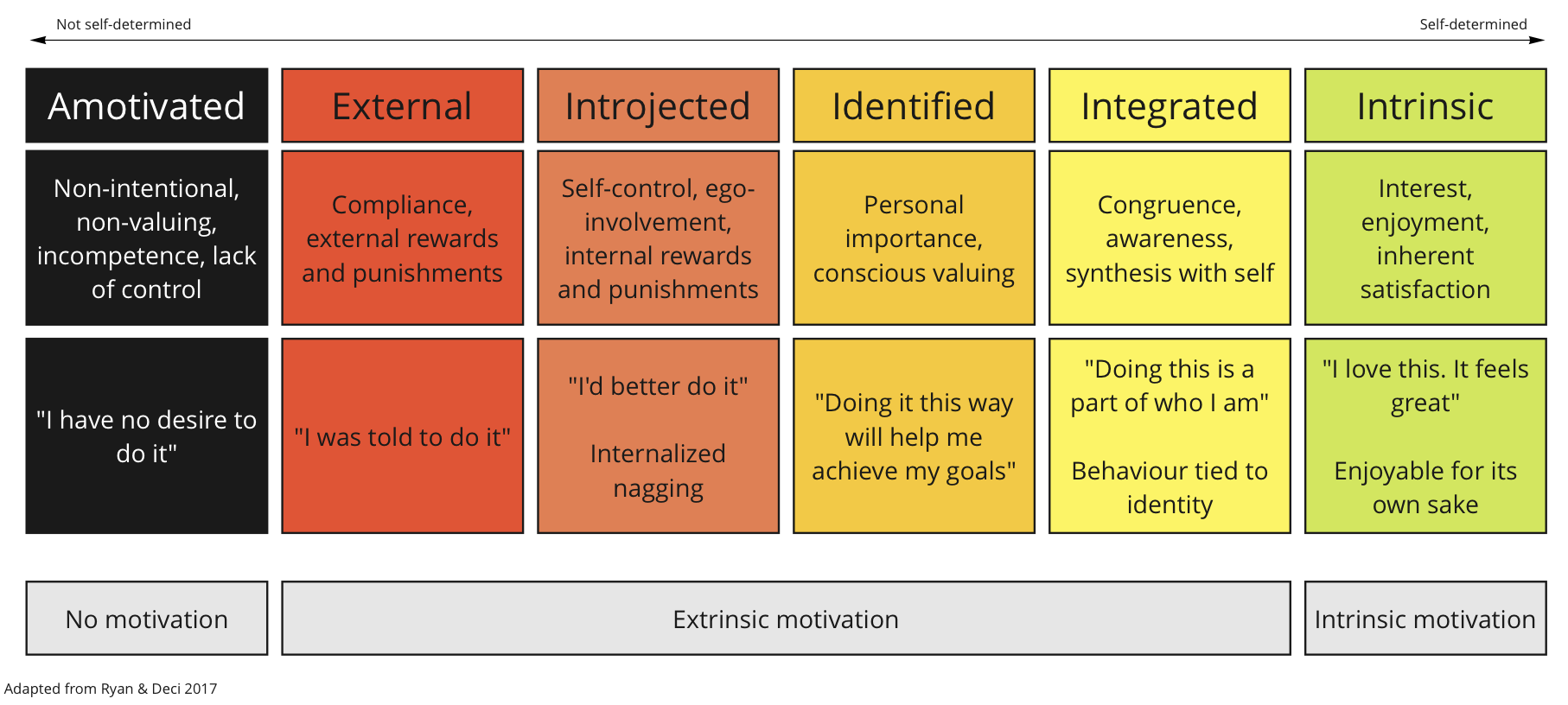I sometimes see teams that make up arbitrary dates to “motivate” the teams to get work done faster. Not only does this not work over the long term, it often makes things worse.
I’ve seen cases where almost every work item on a board has a due date on it. Then when those dates pass and the work still isn’t done, nobody cares. We’ll just pick a different date.
Whenever I’ve seen this, I hear some variation of Parkinsons Law: “Work expands to fill the available time”. People will tell me “if we don’t put a deadline on it then nothing will ever get finished”, and yet this is provably false. Many teams that have no artificial deadlines, deliver regularly.
It’s fair to say that teams that weren’t motivated to deliver, won’t. That’s very different, however, than assuming that dates are the ultimate motivator. Artificial dates are an extremely poor way to motivate and it’s time to stop using them.
Let’s consider the Self-Determination Theory (SDT) motivation model.

For best results, we want to be further right on this diagram. Anyone in the green “intrinsic” block needs no outside motivation. They are motivated by the work itself and will never need encouragement to get the work done.
At the opposite end, on the far left, people who are amotivated have no interest in finishing the work. If it does get finished then that was pure luck.
When we apply dates, we’ve already given up on all the better forms of motivation and are now one step from the far left. We’re into external motivators involving rewards and punishments. We’ve told the teams that there is a penalty if they don’t hit the arbitrary date that we put on the work.
Then we make it even worse. When that first arbitrary date is missed, there are no punishments. We just pick another arbitrary date further in the future. So now we’re trying external motivation but we just took away the threat that makes it work. We’ve potentially now shifted the team further to the left into amotivation.
So how is it that these teams actually deliver anything if they’re amotivated? The short answer is that the individuals likely already have their own motivations that are somewhere in the middle. Perhaps they consider themselves professionals and do the work because this is part of their identity (integrated). Perhaps they want a raise or a promotion and think that completing the work will help them achieve that (identified).
There are a number of studies showing that applying external motivation will usually lower autonomy, which affects not only motivation but also psychological safety. So even if they were motivated in the beginning, applying that external reward or punishment may decrease what motivation had been there, while potentially making them feel less safe at the same time.
The key point is that these people were already motivated and by putting a date on the work, we did nothing to increase that motivation. In fact, we may have decreased it.
So if artificial dates are so counterproductive, what could we do to improve motivation?
I’ve found that getting the team closer to the customer will go a long way towards improving motivation.
If I’m working on something now that a customer might see in six months (typical in a waterfall model), I have no connection to the problems I’m solving for that person. I may be motivated by the technical challenge but fundamentally, I’m just writing code that someone told me to write and I have no connection to the actual problems I’m solving or who I’m solving them for.
On the other hand, if I’m writing some code that Jenna will be using and I’ve met Jenna and know what kinds of problems she’s dealing with, I’m much more motivated. Even better, if I know that Jenna will be using the features tomorrow that I’m working on today, I’m highly motivated to get it done so that she can start using it. We’ve closed the feedback loop. I’m building this to help someone I know and I’m motivated to get it done quickly to help her do her job.
Note that this whole discussion is very specifically talking about artificial dates here. If you have a real business driven date with penalties associated with missing it, then that can be a very effective motivator. Unless, of course, we’ve already pushed the team to the point that they’re ignoring all dates.
The conclusion is simple: If you’re going to put a date on a piece of work, make sure it’s real. Artificial dates don’t improve motivation, and may actually decrease it.

